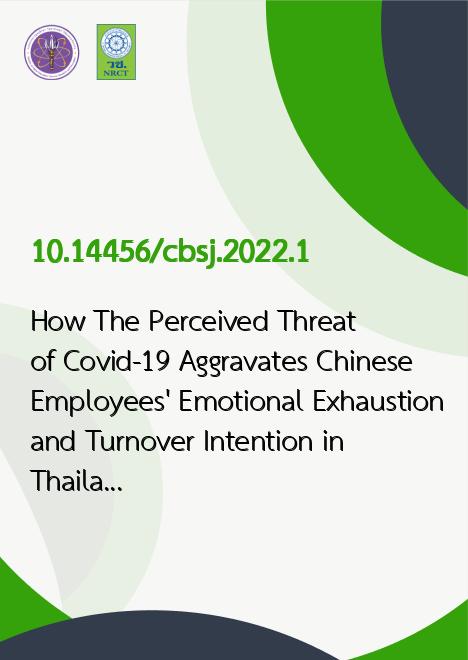
|
How The Perceived Threat of Covid-19 Aggravates Chinese Employees' Emotional Exhaustion and Turnover Intention in Thailand: The Moderating Role of Affective Commitment |
|---|---|
| รหัสดีโอไอ | |
| Creator | Xuemei Sun |
| Title | How The Perceived Threat of Covid-19 Aggravates Chinese Employees' Emotional Exhaustion and Turnover Intention in Thailand: The Moderating Role of Affective Commitment |
| Contributor | Yi Ma |
| Publisher | Chulalongkorn Business school, Chulalongkorn University. |
| Publication Year | 2565 |
| Journal Title | Creative Business and Sustainability Journal |
| Journal Vol. | 44 |
| Journal No. | 1 |
| Page no. | 1-17 |
| Keyword | Covid-19, Affective Commitment, Turnover Intention, Emotional Exhaustion |
| URL Website | https://cbsreview.cbs.chula.ac.th; https://so01.tci-thaijo.org/index.php/CBSReview/index |
| Website title | THAIJO; Creative Business and Sustainability Journal |
| ISSN | 2821-9236 |
| Abstract | The Covid-19 pandemic has caused not only the loss of organizations but also adverse impacts on employees' mental health that have led to unfavorable outcomes. Grounded in conservation of resource theory, this study presents a conceptual model and aims to explore the psychological and behavioral consequences to employees of the perceived threat of Covid-19, as well as exploring the moderating effect of affective commitment on those consequences. A convenience sampling method was used to collect survey data from 248 local hired Chinese employees currently working in Thailand. The results from PLS-SEM analysis significantly confirm that employees' emotional exhaustion resulting from the pandemic can increase their turnover intention. In addition, the results from the moderating effect analysis found that affective commitment can lessen the adverse impact of emotional exhaustion on employees' turnover intentions. Thus, the organizational management should concern themselves with employees' psychological wellness during the pandemic, and make efforts to increase Chinese employees' affective commitment to their organizations. |